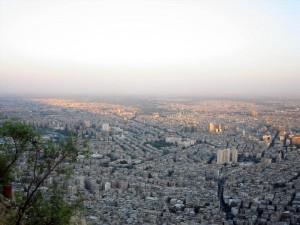There are a few things that we know for sure in relation to the chemical weapons situation in Syria. On the 21st August 2013, rockets containing the nerve gas, Sarin, struck the Ghouta agricultural region just outside Damascus. It’s not 100% clear just how many people died as a result of the attack, but the numbers are at least in their hundreds, but could in excess of a thousand. The chemical weapons attack was just one of a number that occurred throughout 2013.
With so many people dead from the attack, the world looked on for the culprit, but as yet no side has held it’s hand up, with the opposition in the region blaming the government and president Bashar al-Assad claiming that it was the opposition fighters. However, in the wake of the attack, a UN resolution was established to destroy the ruling government’s chemical weapons stockpile in an attempt to neutralise the potential of further attacks. While the resolution isn’t a definitive indication of blame it could be inferred that the UN at least see some correlation between the attacks and the government stockpiles.
Following an agreement between the US and their Russian counterparts, the resolution was established and the Organisation for the Prohibition of Chemical Weapons (OPCW) has been tasked with the required destruction of the chemical weapons. The current OPCW plan sets out to remove and destroy all chemical weapons in the control of the government and its military by mid 2014, but while that will constitute a significant step forward it will not be the justice that those involved deserve and nor will it be a guarantee preventing further attacks.
Looking at the story, there are a number of possibilities that could be at the heart of the attack and the resulting mission for the OPCW. The first of these is the probability that the chemical weapons attack on Ghouta was under the control of the government military. This in itself could have been either a disastrous mistake, although it’s unlikely considering the number of attacks that have taken place, a shocking act of retribution, a brutal attack or a part of a more calculated strategy to win the war by eventually seeming compliant with international stipulation, while also delivering a terrible blow to the opposition fighters.
On the other hand, there’s the possibility that the opposition are to blame for attacks too. As is the case with war in general, atrocities are often committed on both sides of the fence and if this is the case then the OPCW disarmament will not contain the problem. However, the US’s threat of military action response and the subsequent UN resolution are significant factors in the interpretation of events.
There is additionally the possibility for terrorist organisations to be involved in the deployment of some of the chemical weapon strikes that have occurred throughout the conflict to manipulate the situation for their own devices, but if this is the case it would probably be a part of a wider reality, as opposed to the heart of the matter.
While there’s no real way to tell for sure what the truth is, unless new UN verified evidence comes to light, it’s fair to say that there’s enough circumstantial evidence to get a feel for which side of the line you’re going to fall. Whatever your view, right now it’s looking very likely that the al-Assad government will benefit most out of the attack with a significant hit on rural opposition (irrespective of the source) and a new set of open international dialogue to build on.
From an outsider looking in perspective it’s frustrating that more can’t be done to improve the situation and we’re certain that it must be the same for people within the conflict torn country. Either way you look at things, it’s clear that the international community’s war monitoring and policing processes are neither capable of identifying the exact causes of atrocities nor preventing them in advance by destroying known chemical weapons before they’re actually used.
If missiles are already being tracked then surely they should be able to identify their source and act accordingly. If the general public isn’t being provided with the details then more transparency is needed so that we can campaign for a better long term outcome. If the UN doesn’t have any weapons deployment tracking systems to investigate such strikes then isn’t it about time they were developed as a part of their function?
Similarly, if organisations like OPCW are already aware of chemical weapons stores then shouldn’t they be empowered to deal with them prior to an attack. On the other hand, if they do not have the capabilities to identify chemical weapons stockpiles in advance does that imply the need for improved capabilities or better intelligence from UN member states.
Is it too much to ask for the United Nations to keep track on the movements of war and report them to the wider community, as well as providing its affiliated organisations with the capabilities and go ahead to identify and eliminate chemical weapons prior to their deployment?
For more reading on the attack and the subsequent OPCW operation, visit the following sources:
https://en.wikipedia.org/wiki/Ghouta_chemical_attack
https://www.hrw.org/news/2013/09/17/dispatches-mapping-sarin-flight-path
https://www.opcw.org/
https://www.bbc.co.uk/news/world-middle-east-22307705
https://www.bbc.co.uk/news/world-middle-east-24419468



